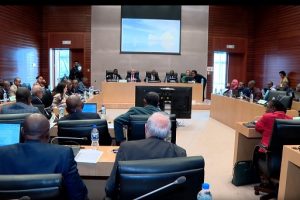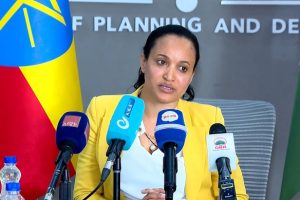Ethiopia has been taking part in a comprehensive range of peacekeeping mission under the umbrella of the UN peacekeeping in several countries.
It is important to remember that in 1950s and 1960’s Ethiopia played a part in the UN peacekeeping undertakings in Korea and Congo. After completing its missions with flying colors, Ethiopia managed to partake in UN peacekeeping mission in Darfur, Southern Sudan, Rwanda, Burundi, Liberia, and Southern Sudan.
Since time immemorial, Ethiopia has been serving in multifarious parts of the world for the most part in the continent of Africa in promoting peace and stability in the Horn of Africa.
As Ethiopia is widely known for promoting peace and development, the Horn region has been going through a relative period of peace and tranquility. The country is revered for sending its troops to quite a lot of war-torn regions in the Horn. So far, Ethiopia’s peacekeeping missions have executed their missions with great discipline and ethics. No sexual allegations or other crimes have been lodged against Ethiopian peacekeeping missions.
The Ethiopian defense force has also carried out peacekeeping responsibilities in various countries with utmost bravery and competence. Its motto “ensuring national security through competent participation in regional, continental and international peacekeeping work” is a reflection of the significance accorded to regional security in promoting national security, said Bereket Gebru in his article entitled “Ethiopia: The Indomitable Force of Peace in The Horn of Africa.”
Some of the major peacekeeping missions include the Rwandan mission during the time of the genocide. The Ethiopian army saw through an impartial peacekeeping work in the zones it was deployed in. The place is called “Changugu.” It was feared for hosting a large concentration of notorious people and terrorists. The impartial activities of the Ethiopian army in that place won it the adoration of both the contending ethnic groups – Hutu and Tutsi. The fact that it managed to ensure peace with social affinity instead of force shocked various peace loving forces including the UN.
Another peacekeeping mission under the current government was in Burundi. Ethiopia was the deputy commander of the African Union mission in Burundi. The mission of the Ethiopian army in Burundi was to control the implementation of the cease fire agreement reached between warring sides, disarming, creating a suitable environment for reconstruction and restoring the political, social and economic status quo to pre-conflict conditions.
The peacekeeping mission that followed that of Burundi was in Liberia. The time spelt a difficult moment in the country that transpired because of the conflict between the government of Liberia and opposition forces. The Ethiopian army was assigned for peacekeeping in the vast area called sector 4 that incorporates over six states. Despite the area being one feared by other peacekeeping forces for harboring a large amount of rebels, the UN made the decision with the army’s track record of quality and strength in peacekeeping along with close affinity to the people on the ground in mind.
Ethiopia’s military intervention in Somalia in 2006 opened a window of opportunity for the deployment of AMISOM, which in turn gave some hope and impetus for the consolidation of the peace process and state building in Somalia. It also encouraged regional security cooperation, as Uganda, Burundi, Kenya, and Djibouti joined AMISOM. Ethiopia’s military intervention in Somalia in 2011 has made a difference in pushing Al-Shabab out of its major strongholds, according to the Horn of Africa Security Dialogue.
Some scholars argue that the greatest defeats suffered by Al-Shabab were inflicted by Ethiopian forces. A number of regions and towns in south-central Somalia-including Hiiraan, Beledweyne, Baidoa, Bay, Bakool, and Galgaduud-were liberated by and with the support of Ethiopian troops. It is also playing an important role in establishing regional and local administrations in liberated areas, although the progress on the ground appears to be slow.
Ethiopia is increasingly described as a regional power in the Horn of Africa, in consideration of its military and diplomatic power and demographic size. Ethiopia’s increasing engagement in regional peace and security issues further indicates that it has the will to lead and influence the region. However, its aspirations are neither explicitly acknowledged by the government, nor defined in its official foreign policy document. Ethiopia’s position and status in the region are under the control of historical factors, the vulnerability of neighboring states, and Ethiopia’s weak economic capacity.
Apart from ethnic, cultural, historical, economic, political, and other ties, the Horn of Africa that consists of Ethiopia, Eritrea, South Sudan, Sudan, Somalia, Somalia, Kenya and Djibouti are geographically positioned in the north-eastern part of the continent of Africa.
Ethiopia maintains a central position in the region and plays an important role in regional peace and security issues, serving for instance as a bulwark against Islamist extremist groups in the region-as a mediator and as a peacekeeper. Ethiopia has also managed to drive regional agendas through the existing regional and continental organizations, namely the Intergovernmental Authority of Development and the African Union.
Since the inception of the mission, Ethiopia managed to partake in various peacekeeping missions at continental and global level. In the present climate, Ethiopia possesses thousands of troops within the sphere of the UN peacekeeping mission. This in black and white shows the fact that Ethiopia has been contributing momentously in the continent of Africa and other parts of the world.
Furthermore, Ethiopia has been carrying out its duties and responsibilities under the UN peacekeeping mission in Abyei which is claimed by both Sudan and South Sudan. In a similar vein, Ethiopia leaves no stone unturned to get to the bottom of the problem between the two nations in an atmosphere of calm. As a matter of fact, the Ethiopian peacekeeping mission under the framework of the UN peacekeeping mission has been maintaining peace in the disputed area. It is crystal clear that Ethiopia is one of the highest troop contributing nations to the United Nations.
In the same way, the Ethiopian Peacekeeping mission has been playing a major role in backing the contiguities and taking part in various development activities.
Fana Broadcasting Corporate reported that Ethiopian Peacekeeping Force 13th Battalion has received a UN certificate and medal for outstanding service in safeguarding peace in South Sudan.
Commander of the 13th Battalion of the Ethiopian Peacekeeping Force, Colonel Meles Yigza has received the medal and certificate award from the Head of the UNMISS Let. Gen Shalashi Tinayker.
The awarded battalion has returned home successfully concluding its mission in safeguarding peace in South Sudan.
He appreciated all peacekeepers that are making the ultimate sacrifices to bring peace to the continent and paid tribute and sent sympathies to the families of those gallant service men and women fallen in the line of duty.
BY ADDISALEM MULAT
THE ETHIOPIAN HERALD SEPTEMBER 3/ 2021




